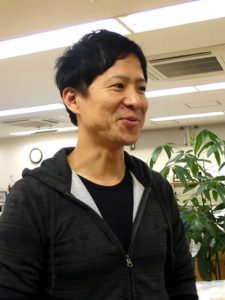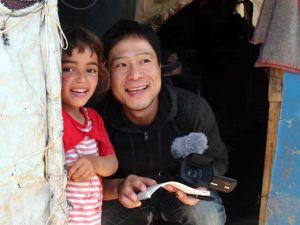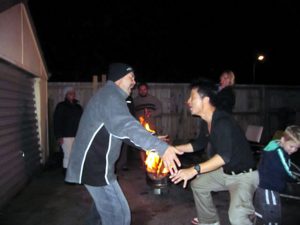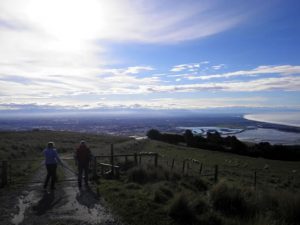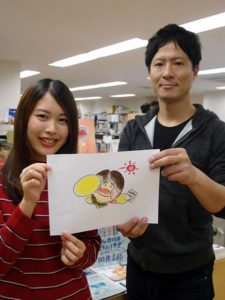[Original by Haruka SHIMIZU, 2015 Public Relations Intern (December 3, 2015); Translated by K. Takemura/S. Thapa]
Hello, my name is Haruka Shimizu. I am a PR intern for JVC. In our fifth installment of staff interviews, we have Mr. Miki Ikeda, in charge of accounting and our Iraq project. It is important for NGOs to manage money rigorously as in companies, since many supporters donate the money. Why does he take part in the Iraq project at the same time? Let’s ask him and find out. He is a typical “Kansai-jin”, a person who grew up in the Kansai area (near Osaka) and speaks this dialect exclusively. I wish I could translate his passionate speech into English!
What led you to participate in the field of international cooperation?
What triggered me is a book entitled “Catalyzing Change in the World”, which I read when I was a graduate student. It is a work of nonfiction about two girls, who studied at the Harvard Business School and established a company to solve poverty issues in Tibet.
Since my father and grandfather were both businessmen, I simply thought that I would establish a company and make money. Why don’t I get rich, live in a gorgeous house, and drive a luxurious car? I thought everyone dreams this, right? In order to make big money, jobs like tax accounting, law, and accounting are great, as one doesn’t need to pay a big initial cost. Actually, I am qualified as a certified public tax accountant and do such jobs on weekends. So the reason I took the qualification for being a tax accountant was to make money.
H.S.: I see, you have unusual career for an NGO staff!
Well, after graduating university, I have worked as a teacher in a preparatory school, a tax accountant, and a salesman of a telecommunications company. I dreamed to make more money by doing such jobs. Meanwhile, I have realized that it is necessary to gain more knowledge in order to make money. I therefore decided to enter graduate school at the age of 30s. It was at that time that I encountered the book mentioned above.
At the first, I was very much impressed by the girls who did not use their ability for themselves but for other people in difficult situations. I found them cool, simply because they were completely different from me, someone who only thought about money. It was 2011. From then on I have dreamed to be involved in activities contributing to society.
Exactly at that time, a big earthquake occurred at Christchurch in New Zealand. I thought I could contribute something and flew to New Zealand after finishing my graduate courses. I had no friends or acquaintances there, but happened to work with a counselor taking care of parents who lost their children. It was an interesting coincidence! Someone who I hitchhiked with introduced the counselor to me.
I have, however, increasingly realized that the counselor had professional skills and knowledge to utilize when helping people. In contrast, I knew little of medicine, spoke poor English, and it was not clear if I was useful to people. It was a very difficult time for me. I worried and worried, and finally found a blog written by a tax accountant named Wakisaka, who says that we can indirectly participate in the field of international cooperation by working as an accountant of an NGO. That’s it! I thought. I am qualified as a tax accountant. I can make use of my profession as a tax advisor in an NGO! So I came back to Japan and applied to the accountant position at JVC.
H.S.: That must have been a big change. I understand that your experience in New Zealand affected you a lot. Have you changed your thinking about money, too?
I now think that it is better to have money than nothing, but I don’t attach much to it anymore. In view of this big change of mine, I believe human beings are so interesting and can change.
H.S.: Do you have a particular experience relating to this?
When I left Japan to New Zealand, I threw away all of my belongings. I thought one could live with seven sets of underwear.
Why do you have two jobs, being an accountant and Iraq project, at the same time?
When I entered JVC, the Iraq project was just under a serious review. There were discussions if we should continue the project or not, because funding was decreasing. I also became involved in the group evaluating the project. I eventually had a chance to visit Iraq for evaluation, where I could see the activities of JVC in cooperating with a local NGO. I found that what JVC was doing there was very valuable.
In particular, I was very much impressed by Mr. Ali, the general director of INSAN, a local NGO of Iraq. He was working so hard to build peace in Iraq in cooperation with JVC. His humanity and way of thinking struck me on a profound level.
After returning to Japan, we continued discussions about the future of the Iraq project. I really wanted to continue it, which was the moment that I started getting more deeply involved in Iraq. If I could not find any meaning of the project in Iraq, JVC might have closed the project and I might not have been involved. I knew little about Iraq at that time, not even knowing the difference between Sunni and Shia.
When do you feel that your varied experiences in society are utilized?
My knowledge of accounting has been very useful in daily work. Another occasion is when we have meetings in the office. As you know, we often have lively discussions. Isn’t it difficult to take a note in such cases? For me, it is no problem, since I can type many words very quickly. I was trained to write long papers, when I was a graduate student (he laughs).
I like our orientations very much, which we have three times a month in the office. I know that I love talking with people. It could be the reason why I was so good at working as a salesman. I can make use of my experiences from that time, when I explain about NGOs and JVC to people for the first time during these orientations. I didn’t imagine that I may work at an NGO in the future, but the experiences from that time have been useful. All experiences count!
You are so good at Kansai language, Ikeda san. When did you come to Tokyo?
I came to Tokyo in order to work at JVC, but I actually didn’t want to come here.
H.S.: Why not?
Don’t you think that people in Tokyo are intimidating? Unfortunately for me, there was only a small number of NGOs for international cooperation in Osaka… That’s why I came to Tokyo. Once I came here, however, I found that people were kind, and that I could get plenty of experiences.
Can you show us a picture you find extraordinary?
This picture shows me practicing “haka” in New Zealand. Do you know haka?
H.S.: Haka? … Do you mean “grave”? (“Haka” means “grave” in Japanese…)
No at all! Haka is haka. (He showed me a video of YouTube, in which All Blacks, the national rugby team of New Zealand, played haka.)
H.S.: This is my first time seeing haka (embarrassed).
You know, in New Zealand, every rugby team dances haka prior to a match. Haka is a traditional dance of the Maori people performed before fighting. This photo was taken when we roasted mutton in a BBQ party. One guy suddenly started teaching me haka. He said, “No! Dance with heart, not by posing!” Don’t you find this great? This picture shows my best memory from New Zealand.
H.S.: It’s really fantastic! Do you have any others?
See this one, it’s beautiful, isn’t it? This is not a mountain but a hill. It was just after the earthquake, which destroyed many cities in New Zealand. I took this photo when I was taking a walk.
You know, New Zealand is the first country in the world in which women were allowed to have right to vote or to be elected. The culture of this country respects minorities and women. People coexist with nature and minorities, which I find wonderful. Although I have visited a limited number of countries, I can say that I found New Zealand the best. I dream of going back here sometime. It is an amazing country.
Lastly, can you tell us your favorite motto, and why?
“Smile, Smile, Smile.”
We can overcome any troubles if we keep smiling.
-[My impression after the interview]
I have never been to Osaka (Kansai), but I find that Mr. Ikeda is a person typical of this area, as he has strong will to achieve financial stability. After hearing about his career up to now, it is quite interesting that accidental encounters with people or books influenced him so much. I also learned about his big love for New Zealand through his two best photos. I cannot forget his stunned face when I said that I didn’t know haka! I should have taken a photograph of that moment! (H.S.)
-[Notice for the next interview!]
The next staff member for our interview is “The Sun of JVC”, as Mr. Ikeda puts it. Stay tuned for the next interview!
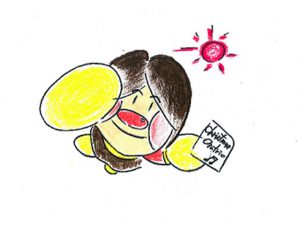
Cute! This drawing by Mr. Ikeda is a cross between the staff member who we will cover next and a character of a famous animation.
* The order of uploading the English version of “Staff Interview” is random and hence different from the order of the original Japanese version. We are sorry, but the person coming next may be different from the “next person to be interviewed” mentioned in the text.
Share This:
